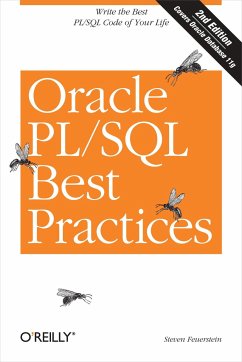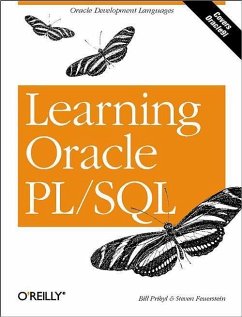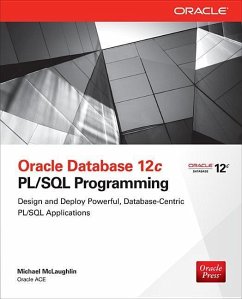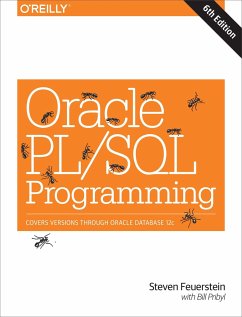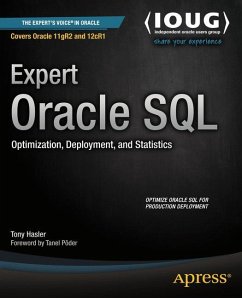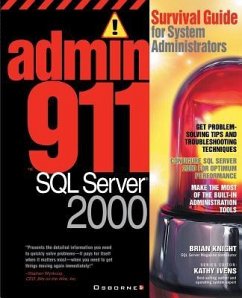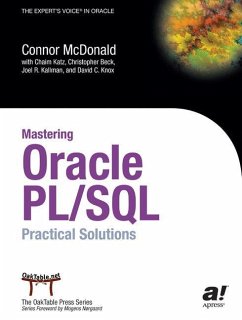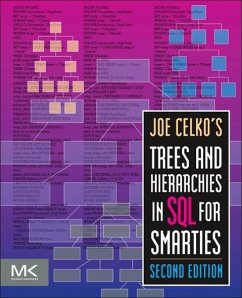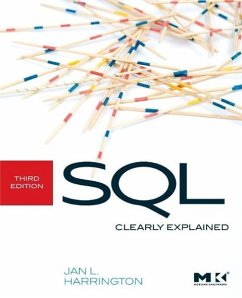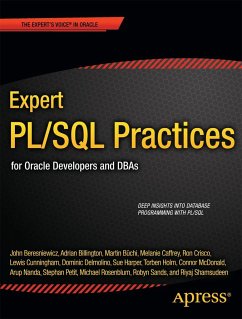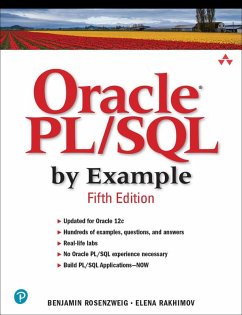
Oracle PL/SQL by Example
Versandkostenfrei!
Versandfertig in über 4 Wochen
54,99 €
inkl. MwSt.

PAYBACK Punkte
27 °P sammeln!
Like the previous edition, this tutorial is an integrated learning solution that teaches all the Oracle PL/SQL skills you need, hands-on, through real-world labs, extensive examples, exercises, and projects. Completely updated for Oracle 12c, it covers all the fundamentals, from PL/SQL syntax and program control through packages and optimization.
This book’s approach reflects the authors’ award-winning experience teaching PL/SQL programming to professionals. Providing readers with the accompanying schema that can be used for practice allows the authors to explain PL/SQL concepts through examples. Each concept is explained first, then illustrated via examples and interactive labs that introduce topics about Oracle PL/SQL. The topics are discussed briefly and then explored through exercises. Each exercise consists of a series of steps followed to perform a specific task, along with questions designed to help you discover the important things about PL/SQL programming on your own. The answers to the questions are then given with more in-depth discussion of the topics. In this way the answers are not just solutions to the exercises but a continuation of the learning process. The exercises are intended to act as your guide to walk you through a particular task. Finally, at the end of each chapter there is a "Test Your Thinking" section made up of a series of projects designed to solidify all of the skills learned in the chapter.
Key topics covered include:
Using conditional and iterative program control techniques, including the new CONTINUE and CONTINUE WHEN statements
This book’s approach reflects the authors’ award-winning experience teaching PL/SQL programming to professionals. Providing readers with the accompanying schema that can be used for practice allows the authors to explain PL/SQL concepts through examples. Each concept is explained first, then illustrated via examples and interactive labs that introduce topics about Oracle PL/SQL. The topics are discussed briefly and then explored through exercises. Each exercise consists of a series of steps followed to perform a specific task, along with questions designed to help you discover the important things about PL/SQL programming on your own. The answers to the questions are then given with more in-depth discussion of the topics. In this way the answers are not just solutions to the exercises but a continuation of the learning process. The exercises are intended to act as your guide to walk you through a particular task. Finally, at the end of each chapter there is a "Test Your Thinking" section made up of a series of projects designed to solidify all of the skills learned in the chapter.
Key topics covered include:
Using conditional and iterative program control techniques, including the new CONTINUE and CONTINUE WHEN statements
Using PL/SQL for Oracle Database 12c, you can build solutions that deliver unprecedented performance and efficiency in any environment, including the cloud. Oracle® PL/SQL by Example, Fifth Edition, teaches all the PL/SQL skills you ll need, through real-world labs, extensive examples, exercises, and projects. Now fully updated for the newest version of PL/SQL, it covers everything from basic syntax and program control through the latest optimization and security enhancements.
Step by step, you ll walk through every key task, mastering today s most valuable Oracle 12cPL/SQL programming techniques on your own. Start by downloading projects and exercises from informit.com/title/0133796787. Once you ve done an exercise, the authors don t just present the answer: They offer an in-depth discussion introducing deeper insights and modern best practices.
This book s approach fully reflects the authors award-winning experience teaching PL/SQL to professionals at Columbia University. New database developers and DBAs can use it to get productive fast; experienced PL/SQL programmers will find it to be a superb Oracle Database 12csolutions reference.
New in This Edition
Updated code examples throughoutResult-caching of invoker s right functions for better performanceExtended support for PL/SQL-only data types in dynamic SQL, OCI, and JDBCSecurity enhancements, including ACCESSIBLE BY whitelists, improved privilege control, and Invisible Columns
Other topics covered
Mastering basic PL/SQL concepts and language fundamentals, and understanding SQL s role in PL/SQLUsing conditional and iterative program control, including CONTINUE and CONTINUE WHENEfficiently handling errors and exceptionsWorking with cursors and triggers, including compound triggersUsing stored procedures, functions, and packages to write modular code that other programs can runWorking with collections, object-relational features, native dynamic SQL, bulk SQL, and other advanced features
Step by step, you ll walk through every key task, mastering today s most valuable Oracle 12cPL/SQL programming techniques on your own. Start by downloading projects and exercises from informit.com/title/0133796787. Once you ve done an exercise, the authors don t just present the answer: They offer an in-depth discussion introducing deeper insights and modern best practices.
This book s approach fully reflects the authors award-winning experience teaching PL/SQL to professionals at Columbia University. New database developers and DBAs can use it to get productive fast; experienced PL/SQL programmers will find it to be a superb Oracle Database 12csolutions reference.
New in This Edition
Updated code examples throughoutResult-caching of invoker s right functions for better performanceExtended support for PL/SQL-only data types in dynamic SQL, OCI, and JDBCSecurity enhancements, including ACCESSIBLE BY whitelists, improved privilege control, and Invisible Columns
Other topics covered
Mastering basic PL/SQL concepts and language fundamentals, and understanding SQL s role in PL/SQLUsing conditional and iterative program control, including CONTINUE and CONTINUE WHENEfficiently handling errors and exceptionsWorking with cursors and triggers, including compound triggersUsing stored procedures, functions, and packages to write modular code that other programs can runWorking with collections, object-relational features, native dynamic SQL, bulk SQL, and other advanced features



